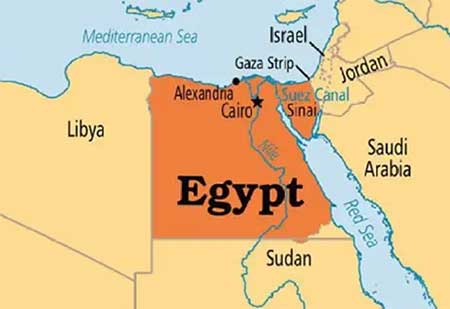Date : 24/06/2023
Relevance : GS Paper 2 : Bilateral relations
Key Words: Cairo Summit, NAM, South- South Cooperation, EXIM Bank
Context -
- India and Egypt share a deep-rooted civilizational connection dating back to ancient times. However, despite decades of cordial relations, bilateral ties have not translated into substantial outcomes.
- As Prime Minister visits Egypt for the Cairo Summit, it is crucial to identify opportunities for greater relevance and strengthen bilateral cooperation.
- The President of Egypt, Abdel Fattah El-Sisi was the Chief Guest at India’s 74th Republic Day celebrations this year. In his meeting with the Prime Minister of India, the two nations agreed to elevate the India-Egypt Relationship to ‘strategic partnership’.
- Egypt has also been invited as a ‘Guest Country’ during India’s Presidency of G-20 in 2022-23.
Historical Background:
- India-Egypt relations can be traced back to 2750 BCE when the Pharaoh Sahure sent ships to the "Land of Punt," believed to be peninsular India.
- The exchange continued, with Egyptian mummies wrapped in Indian indigo-dyed muslin in the second millennium BCE.
Egypt holds significant strategic importance to India due to various factors:
- Strategic Location: Egypt's location, specifically the presence of the Suez Canal, plays a crucial role in international trade. The canal serves as a major transportation link, handling a significant portion of global trade. It provides India with access to both European and African markets, making it an important trade hub. India can benefit from Egypt's position as a hub for production and re-export, particularly in the Arab world and Africa.
- Energy Resources: Egypt is a significant supplier of crude oil and natural gas to India. As one of the major importers of Egyptian petroleum products, India relies on Egypt as a reliable partner in fulfilling its energy needs.
- Influence in the Arab World: Egypt holds a prominent position in the Arab world, as evidenced by its role as the headquarters of the Arab League. This demonstrates Egypt's influence and diplomatic capital in the region. India considers Egypt as an important partner in navigating regional dynamics and expects support from Egypt as a responsible Arab power.
- Influence among Islamic Nations: Egypt is recognized as a moderate Islamic voice within the Organisation of Islamic Cooperation (OIC), a multilateral organization comprising 57 Muslim-majority countries. India views Egypt as a friend within the OIC and values its moderate stance, which can help foster understanding and cooperation between India and other OIC member nations.
- Shared Concerns: India and Egypt share concerns regarding the spread of violence, terrorism, and extremist ideologies. Both countries recognize these threats as significant challenges to global peace and stability.
Current Trade and Investment Scenario:
- Despite a century of bilateral engagement, the trade volume between India and Egypt stands at $6,061 million in 2022-23, with a 17% decline from the previous year.
- Petroleum-related products constitute a significant portion of the trade. India ranks as Egypt's sixth-largest trading partner, while Egypt is India's 38th.
- Indian investments in Egypt are concentrated in 50 projects totaling $3.15 billion, while Egypt's investments in India amount to $37 million.
- The number of Indians residing in Egypt is relatively small, with a significant proportion being students.
Challenges and Opportunities:
- While institutional mechanisms for bilateral cooperation exist, their effectiveness and purpose need to be enhanced. Egypt, with its large population of 105 million and a $378 billion economy, presents substantial opportunities for collaboration.
- The Egyptian government's infrastructure development agenda, including projects such as New Cairo, a nuclear power plant, and a high-speed rail network, offers avenues for Indian participation.
- Additionally, Egypt's import requirements, such as refined petroleum, wheat, cars, corn, and pharmaceuticals, align with India's export capabilities.
- However, challenges persist, primarily stemming from Egypt's economic crisis. The country faces financial constraints, a stagnant economy, inflation above 30%, currency depreciation, and foreign exchange scarcity. The government has deferred payments for essential imports like wheat due to foreign exchange shortages. Despite a $3 billion bailout package from the International Monetary Fund, economic reforms have faced obstacles, hampered by vested interests and crony capitalism. Gulf Arab states, once major supporters of the Egyptian economy, have become cautious due to governance concerns.
Strategies for Successful Collaboration:
- To navigate these challenges and leverage opportunities effectively, India must carefully evaluate its exposure to Egypt.
- Exploring innovative financing mechanisms such as EXIM lines of credit, barter arrangements, and rupee trading can facilitate bilateral trade.
- However, India should avoid past experiences, such as in Iraq during the 1980s and 1990s, where delayed project payments burdened Indian taxpayers.
- Instead, India can consider trilateral funding arrangements involving Gulf partners, the G-20, or multilateral financial institutions for projects in Egypt or other similar countries.
- India and Egypt had lead the way in establishing NAM in the 1950s. Amidst geopolitical uncertainties of present times, India and Egypt should collaborate to strengthen the South-South Cooperation and call for a rules-based global order.
- India should look to expand the scope of defense relationship from bilateral exercises to joint development/manufacturing projects. Egypt can be a potential destination for India’s defense exports.
Conclusion:
As Prime Minister Narendra Modi visits Egypt for the Cairo Summit, it is essential to reinvigorate India-Egypt relations. By addressing challenges, leveraging opportunities, and adopting strategic financing approaches, both countries can enhance bilateral cooperation and achieve substantial outcomes. The historical ties and cultural affinities provide a strong foundation for building a mutually beneficial partnership, ushering in a new chapter of collaboration between India and Egypt.
Probable Questions for Mains exam-
- What is the significance of Egypt's strategic location for India? Discuss how it can benefit India in terms of trade and access to markets. (10 Marks, 150 Words)
- How can India leverage its presidency of the G-20 to enhance its engagement with Egypt? Discuss the potential benefits of Egypt's participation as a guest country during India's G-20 presidency (15 Marks,250 Words)
Source : The Hindu






















